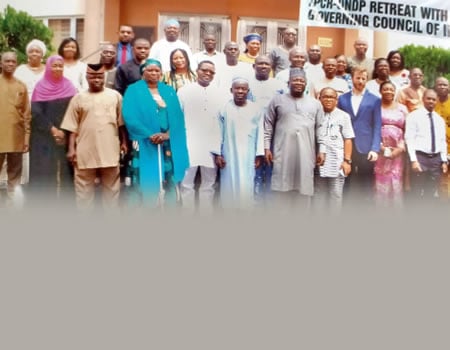
As part of activities to further entrench peace and ensure a conflict free election in 2019, the Institute for Peace and Conflict Resolution (IPCR), an agency of the Federal Government recently held a retreat for members of its recently constituted Governing Council in Ibadan. YEJIDE GBENGA-OGUNDARE reports that the two-day retreat exposed council members to requirements to be keep abreast of activities of the institute as well as working relationships, collaborations and partnerships with national and international agencies and how paucity of funds serve as the major challenge faced in conflict management and mediation.
Nigeria is a society that is now synonymous to notorious and high level of unpredictable violence, ethnic and religious sectarianism, giving rise to the need for strategic approach as well as periodic and continual evaluation of the process of peace building, conflict management and social orientation of people on issues of violence. One of such evaluation was the recent retreat held by the Management of the Institute for Peace and Conflict Resolution (IPCR) for its recently constituted governing council members and the representatives of the United Nations Development Programme (UNDP).
ALSO READ: Presidency attacks Jonathan over TSA, BVN, IPPS introduction claim
The retreat which was held in Ibadan, the Oyo state capital was based against the backdrop that the council members require good understanding of conflict risks and peace building opportunities provided by the creation and establishment of IPCR, the Federal Government’s apex peace and conflict resolution establishment in Nigeria saddled with the responsibility to research on peace and conflict issues, provide quality advice to the government and intervene to prevent, manage and resolve conflicts in Nigeria and Africa.
Though the institute, since establishment had been functioning without a governing council until recently that the Federal Government constituted and inaugurated its council and despite paucity of funds, has continued to engage cross-cutting issues of conflict resolution, peace building and policy research and advisory. It has recorded remarkable successes in the areas of conflict research, peace policy, mediation and conflict resolution trainings and workshops amidstseveral challenges.
The retreat was therefore to give opportunity to the new council to know and understand activities and programmes of the institute especially its partnership with agencies like the UNDP, UNHCR, UNICEF, UN Women and Diplomatic Missions among others. And according to Emmanuel Mamman of the IPCR, the council would require to have a synoptic view of the diverse peace activities within and around Nigeria. “There is a growing sophistication in behaviour patterns and social relations of people in the society that appears to put a lot of demands on conflict resolution practitioners. The current situation in Nigeria is that social crises and criminal activities have attained new and frightening dimensions, which conflict resolution and peace practitioners have to demonstrate consistent capability to contain,” he stated.
And based on the context of current threats to peace, security and stability in Nigeria, the retreat aims to enhance communication and service delivery between the Institute and the newly constituted governing council in order to empower them to question and influence conflict mitigation strategies and policies, create platform for the review of the mandate, successes, challenges and prospects of the institute in the light of the constitution of its Governing Council and the increasing violent conflicts that are posing serious threats to peace and security in the country.
34 people including representatives from the IPCR, UNDP and members of the IPCR governing council, the Acting Director General, Dr. Bakuttswah Bakut; the Institute’s management staff and the UNDP team led by the Deputy Country Director (Programmes), Joerg Kuehnel participated at the retreat which ended with an understanding that sustainable peace was not a happenstance so IPCR and the governing council must work together to secure sustainable investment, commitment of personnel, innovation in systems and processes and collaboration with stakeholders.
Dr. Bakuttswah Bakut stated that the retreat was a platform for the IPCR management to commune with its governing council and the UNDP in order to reflect and re-examine its activities, adding that it was the right platform to discuss methods to improve and refocus in relation to the Act of the Institute and its mandate in order to strengthen its existing relationships and re-strategize to form new ones.
Kuehnel suggested the possibility of a Peace Fund, adding that he was keen to understanding better, the relationship between the IPCR and the proposed Peace Commission and how this relationship will impact on the present relationship with the UNDP as the stability in Nigeria means stability in the West African region.
And with the conclusion that the cost of conflict is higher than peace building, the retreat stressed that it was imperative for the council and management of IPCR to understand the importance of peace building and look into existing or emerging opportunities, do self-examination to develop new products and services, help attract partners, develop a platform to provide oversight and quality control for peacebuilding intervention in Nigeria, and explore opportunities to grow and to model IPCR.
IPCR and UNDP promised to work together without hindering the agency’s independence while work on IPCR 2019 work plan continues.





